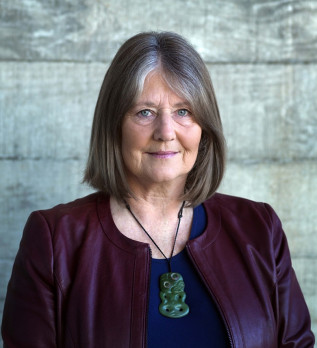2024 Council Election - Councillor elected by Māori Electoral College
Distinguished Professor Christine Kenney MRSNZ (Te Āti Awa, Ngāti Toarangatira, Ngāi Tahu) has been elected onto the Royal Society Te Apārangi Council as a Councillor elected by the Māori Electoral College.
Distinguished Professor Christine Kenney MRSNZ
(Te Āti Awa, Ngāti Toarangatira, Ngāi Tahu)
 Nominated by: Professor Jarrod Haar FRSNZ & Professor Anthony Hōete FRSNZ
Nominated by: Professor Jarrod Haar FRSNZ & Professor Anthony Hōete FRSNZ
Candidate Statement:
As inaugural Professor of Disaster Risk Reduction (DRR) and Co-Director of Research for the College of Humanities and Social Sciences at Massey University, I am a staunch advocate of innovative research, and transformative scholarship. My passion for Māori science capability development is underlined by a strategic vision that led to the establishment of Te Toi Whakaruruhau o Aotearoa, the National Mātauranga Māori Disaster Research Centre, which I lead as the Kaiwhakahaere Matua with the support of my Māori research colleagues.
My background as a sociologist of science and health clinician/researcher, has shaped research and policy leadership work underpinned by culturally responsive and professional ethical standards and focused on disaster risk reduction, health, and humanitarian issues. Māori and Indigenous Peoples’ concerns pertaining to climate change, natural hazards, gender, public health, and wellbeing, are central to my interdisciplinary work, which is strengthened by understanding diversity within research, scholarship, and innovation across all science fields.
I honed personnel management, business skills and governance expertise within senior roles in the corporate world (Price Waterhouse, Mitsubishi), which have required financial literacy, and appreciation of compliance, reporting, privacy issues, health and safety legislation as well as contract law. These skills have been refined in academia overseas (University of Alberta) and New Zealand, strengthening my research leadership within MBIE’s national science challenges, Endeavour, EQC, QuakeCoRE and Marsden programmes. Recent work has focused on partnering with tangata whenua and encompassed co-leading the national science challenge RNC rural research programme, the MBIE Endeavour programme Pungapunga Auaha, and a third Marsden project exploring how Mātauranga Māori enhances Māori-led disaster recovery. A strong commitment to Māori science capability building has contributed to engagement in numerous committees including a five-year engagement and role as Chair with MBIE’s Te Pūnaha Hihiko Vision Mātauranga Capability Fund Panel, as founding Chair of EQC’s Māori Research Funding Panel, and an appointment to the 2023 Rutherford Foundation Trust Panel.
My involvement in the strategic science policy to practice sector, in New Zealand and globally, where I have strongly promoted Māori and Indigenous science capability, is extensive. Advocacy for Māori aspirations, legislative recognition, and funding for tangata whenua has resulted in appointments to Ministerial committees, notably Emergency Management and MBIE’s Special Extreme Weather Advisory Panel. I also co-lead projects with Indigenous communities in North America, China, Canada, and Australia and regularly work on Indigenous concerns with the World Health Organisation and United Nations agencies (UNDRR, UNESCO, UNOCHA). I chaired the UNDRR/International Science Council Indigenous Disaster Science caucus and was a lead-author on the United Nation’s 2022 Global Assessment Report. These fora provide important opportunities to ensure global recognition of Indigenous languages, and knowledges as well as chances to shape global science agendas, and strategies that impact Aotearoa and significantly tangata whenua.
I equally appreciate the opportunity to support our kāhui of Māori researchers, that membership of the Royal Society Te Apārangi Council offers. I would be humbled and thrilled to have this honour, and it would be a privilege to facilitate the advancement of science, within Aotearoa.
